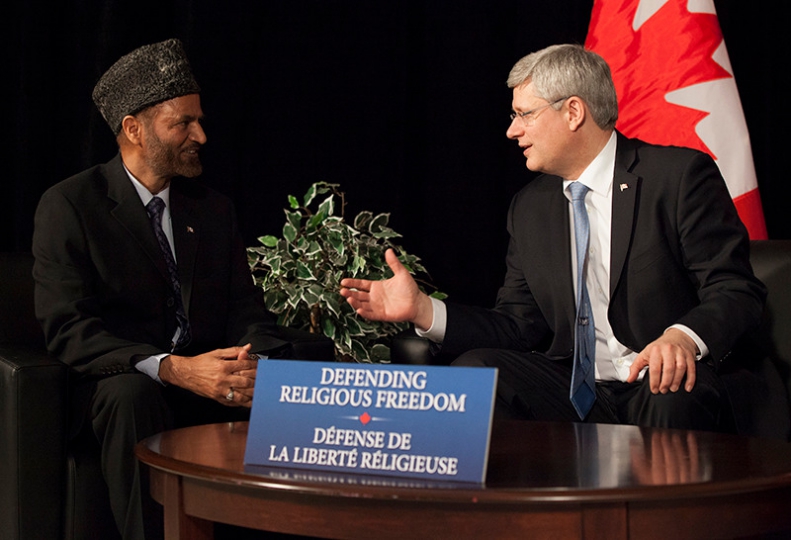
The politics of religion? Prime Minister Stephen Harper with Lal Khan Malik, national president of Ahmadiyya Muslim Jama'at Canada, prior to announcing the establishment of the Office of Religious Freedom on Feb. 19, 2013. (PMO handout)
On religion and the workings of our political morality
Steven Lecce, head of political studies in the Faculty of Arts at the U of M, will speak about the secularization of society at the Dec. 11 Visionary Conversations. He shared some of his thoughts with UM Today in advance of the event.
In a democracy, citizens must present one another with publicly acceptable reasons for their legislative and policy positions.
This might sound like a purely negative injunction because it seems to require that, for political purposes, we bracket the most important things: for example, the religious beliefs that specify what ultimately matters in life, and also how it should be led.
Appearances are deceiving. Fundamentally, state neutrality between contested ethical ideals, including religious ideals, reflects an attractive conception of democratic citizenship. When we limit our reasons for favouring one or another law or policy to those consistent with seeing one another as equals, we are saying something profound and important about how the political relationship is to be understood.
In this way, public reasoning is the deliberative expression of an underlying and inviolable equality of status that we share and that transcends our more particularistic attachments and commitments. As one critic astutely observes, liberal democracy is not premised upon diversity, but rather on shared political commitments weighty enough to override competing values. Since political power is coercive, (partly) involuntary, and profoundly influential to our overall life prospects, it should be exercised on the basis of reasons and interests that are also shared, or at least potentially sharable.
As one critic astutely observes, liberal democracy is not premised upon diversity, but rather on shared political commitments weighty enough to override competing values.
This implies a certain fragmentation of perspective, or partitioning of motives, between political and personal morality. On the one hand, as citizens, we are to support the idea of public reason by doing what we can to hold government officials to it, and by upholding the law. In sum, while we have duties to treat others justly, these obligations are externalized in the social, economic and legal institutions that set out our basic rights and responsibilities as citizens.
On the other hand, as people in our day-to-day lives, with our thickly constituted attachments and relationships, we are free to move in and out of various associations and relationships that form the background culture of civil society – for instance, universities, churches, sporting clubs and philosophical societies – and to appeal to the various forms of non-public reasoning appropriate to each of them.
There is a kind of ethico-political schism at work here, as it were, but it should be celebrated. By discouraging total investments of personal identity and moral capital in politics, liberalism safeguards our ethical lives from overly intrusive collective scrutiny and control.
Steven Lecce teaches political theory in the department of political studies at the University of Manitoba, where he is department head. His research is primarily concerned with contemporary theories of social and distributive justice, and the ethical bases of the liberal-democratic state. He is the author of Against Perfectionism: Defending Liberal Neutrality, and numerous articles about political philosophy. Earlier this year, he was a Visiting Scholar at Oxford University’s Centre for the Study of Social Justice.







